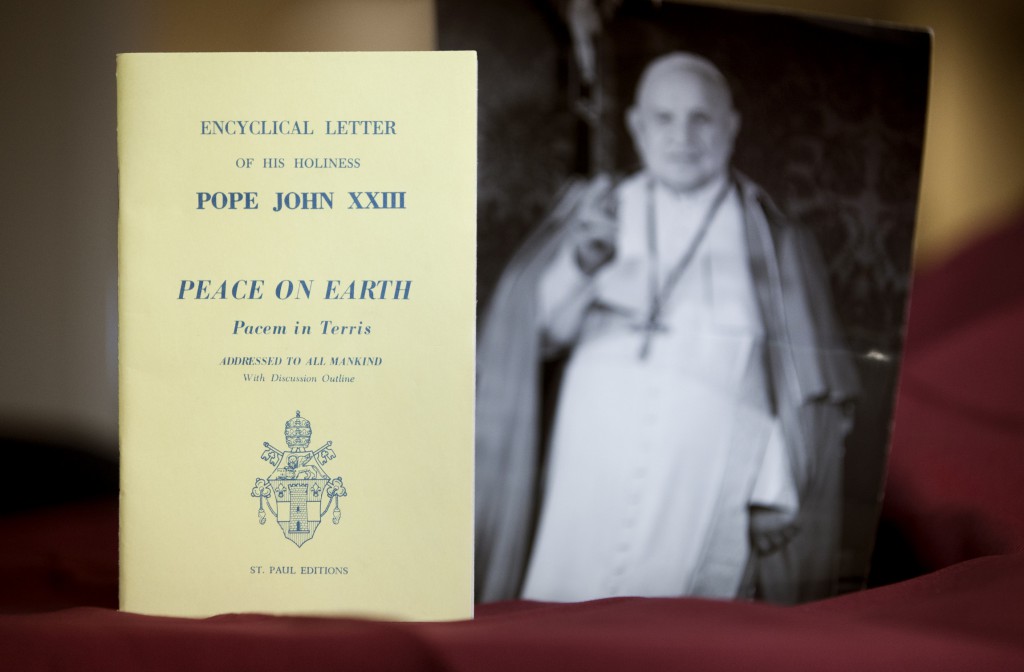
By Dennis Sadowski
Recognizing the inherent dignity of each person is the greatest weapon anyone has against war and violence, Cardinal Peter Turkson, president of the Pontifical Council for Justice and Peace, told a conference marking the 50th anniversary of Blessed John XXIII’s encyclical “Pacem in Terris” (“Peace on Earth”).
Peace is intimately connected to working for justice, otherwise violence will be difficult to overcome, Cardinal Turkson said in an address April 10 at The Catholic University of America to about 150 participants in the conference sponsored by the Catholic Peacebuilding Network.
“Peace then is not merely the absence of war and conflict, but it represents … a gift from God,” the cardinal said.
“Peace is an attribute of God himself. God is peace. Creation aspires to peace,” he added.
In an interview with Catholic News Service following his address, Cardinal Turkson said “Pacem in Terris” remains as important for the world today as it was when it first appeared.
“If any factor in society in any way treads on or diminishes or makes it difficult for people to realize their dignity, the common good the human flourishing, human development that for us is a crisis moment. If we can do anything to promote the development of human society that’s what we stand for,” he said.
The two-day conference examined various aspects of the encyclical, which was promulgated April 11, 1963, by Blessed John months after the Cuban missile crisis brought the world to the brink of nuclear war between the United States and the former Soviet Union. Speakers looked at how the encyclical remains among the most significant components of Catholic social thought.
At the time, Blessed John’s concern for the world extended beyond the elimination of nuclear weapons from the arsenals of the superpowers. He expanded the church’s view that human rights and human dignity were as vital to peace as the end of war in an overall positive outlook for humanity. His teaching built upon the principles enshrined in the Universal Declaration of Human Rights adopted by the United Nations in 1948.
Blessed John identified emerging political and sociological trends that later moved forward at a rapid pace such as the empowerment of women worldwide, economic and social globalization and the rise of newly independent states as European colonialism began to decline. The encyclical recognized the rights of all people to food, water, safety, housing, health care, involvement in public life and affiliation in groups that promote their well-being, from labor unions to civic groups.
Several speakers noted the widespread use of the term “common good” in the encyclical and that the work was not just addressed to Catholics but to “men of good will” no matter their faith or heritage.
John Carr, former director of the U.S. bishops’ Department of Justice, Peace and Human Development, cited paragraphs 163 and 164 of the encyclical as the cornerstone of peacebuilding efforts in calling Christians to be a “glowing point of light in the world, a nucleus of love, a leaven of the whole mass.”
Such is the nature of the work of the church on behalf of human life and dignity, he said. “We ought to act as if this is good news.”
Conference sessions examined political as well as social issues that affect world peace and how “Pacem in Terris” addresses each. Presenters discussed the just-war theory, the evolution of nuclear weapons policy since the end of the Cold War, the role of Catholic colleges and universities and religious orders in educating students in the practice of reconciliation and nonviolence, the institutional church’s role in reducing violence and promote understanding in conflict zones around the world, and examples of on-the-ground programs of Catholic Relief Services that best reach people in need
Carolyn Woo, president and CEO of CRS, told the conference while the world has seen the number of people living on $1.25 or less per day decrease from 1.9 billion to 1.3 billion since the 1980s, 2 billion people have gained access to clean water since the 1990s and that 97 percent of girls around the world are enrolled in elementary schools, numerous challenges to achieving peace remain.
Inequality among people, poor governance, human rights abuses, conflict over natural resources and environmental degradation are impediments to the peace that Blessed John envisioned, she said.
“Remember the work of peace is very hard,” she said. “It’s the work of Christ.”
In a session on nuclear weapons, Father J. Bryan Hehir, a theologian and faculty member at the Kennedy School of Government at Harvard University, said the world continues to deal with the dangers such weapons pose years after the Cold War ended.
Blessed John saw a world where two superpowers could easily engage in nuclear war, prompting him to write the encyclical, he explained. Today, instead of two nations with nuclear weapons, there are nine, he continued, and the concern focuses on nuclear proliferation as more countries and non-state actors seek out such weapons.
Father Hehir urged Catholics to be vigilant and continue to call for new arms reductions and for limits on proliferation with the ultimate goal of “going to zero.” – CNS